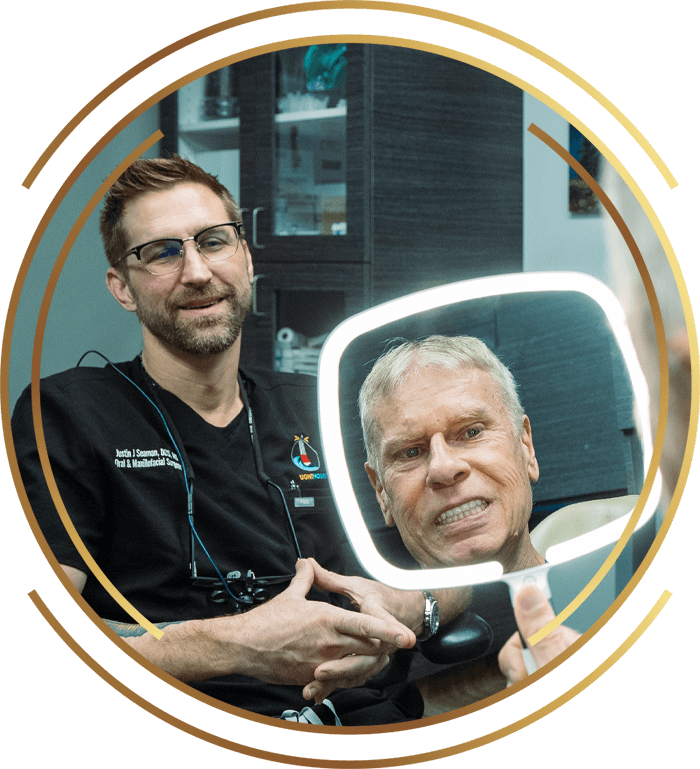
If you’re like many patients, your wisdom teeth (third molars) will never fully erupt. However, even if the crowns aren’t peeking through your gums, you may know their presence. Impacted wisdom teeth can assume many positions in your jawbone as they attempt to find a pathway that enables successful eruption. When they partially erupt, plaque accumulates, and bacteria grows, resulting in swelling, pain, decay, and even infection. The pressure from erupting wisdom teeth may move other teeth and disrupt the orthodontic or natural alignment of your teeth.
Whether you’re experiencing active problems or not, wisdom teeth extraction in Memorial, Houston, TX, or Medical Center, Houston, TX, during your teenage years or early 20s is often advised to avoid future problems. Early wisdom tooth extraction will also decrease the surgical risks when this procedure is performed after age 30. Our experienced oral and maxillofacial surgeons will determine if a wait-and-see and periodic monitoring approach or prompt extraction is best for you.


Learning about wisdom tooth removals at Lighthouse Oral & Maxillofacial Surgery can help settle your nerves and set you up for smoother surgery and recovery.
During your wisdom tooth consultation, it’s important to tell us about any preexisting medical conditions and medications. Our oral surgeons consider this during wisdom tooth removals. Radiographs determine the exact position of your wisdom teeth, root structure, and bones and are essential for planning surgery and explaining how it will be performed.
We offer all levels of sedation, and we’ll help you choose the best method to meet your needs. Nicotine can affect circulation and slow healing, so we discourage smoking for at least 24 hours before and after wisdom teeth removals at Memorial, Houston, TX, or Medical Center, Houston, TX.
Wisdom teeth extraction is an outpatient procedure that we perform in the comfort and convenience of our primary practice location or if clinically warranted at our hospital-based practice, Medical Center, Houston, TX. The length of surgery depends on several factors, including the position of your wisdom teeth, the size and curvature of the roots, and bone thickness around your teeth. In general, uncomplicated surgery in which the root structure has not fully formed can often be performed in 45 to 60 minutes to remove all four wisdom teeth. More complicated procedures in which the tooth roots are tangled with the sensory nerves can take longer.
After anesthesia has been administered, our oral surgeons remove fully erupted wisdom teeth in one piece. An elevator widens the socket, and the loosened tooth is extracted using forceps. If the tooth is impacted, a small incision is made in your gum tissue to fully expose it. Any bone blocking the tooth is removed to prevent damage to adjacent teeth. It’s common to remove an impacted wisdom tooth in several small pieces.
Stitches are used to close the extraction site, and special stitches that dissolve on their own as your gums heal are also available. A piece of clean gauze is placed over your extraction site, and we’ll ask you to bite down to apply pressure and stop any bleeding. Following surgery, we continue to monitor your vitals while the anesthesia wears off.
Anesthesia will prevent you from feeling discomfort during surgery and for a few hours after that. Over-the-counter pain relievers or prescription medications can be used to manage discomfort and swelling at home. You can also apply an ice pack wrapped in a towel to your cheek in 20-minute intervals. If you experience any bleeding, bite down on a gauze pad or a damp tea bag for several minutes. In addition, you can ease recovery by following these tips:
Avoid any dairy products because they may interact with the anesthesia medication and cause nausea or vomiting

Although some third molars come in correctly and don’t need to be extracted, many issues can arise when there is inadequate space at the back of your mouth. Removing impacted wisdom teeth can prevent gum infections, discomfort, difficulty chewing or swallowing, fluid-filled sacs (cysts) in the jawbone near wisdom teeth, and damage and alignment problems caused by crowding.
Rest assured, you’re in highly skilled and compassionate hands at Lighthouse Oral & Maxillofacial Surgery. Our oral surgeons are specifically trained to manage complex dental procedures and administer soothing sedation. Should an unlikely complication arise, such as nerve injury, bleeding, maxillary sinus issues, or infection, we have far more experience resolving these problems than a general dentist.
Your gums will be swollen for a few days after surgery and may feel as though they ‘re pulling away from your teeth. This sensation is normal and will pass as the swelling decreases. If you’re tolerating clear liquids, you can add soft foods, such as creamy soups, pudding, applesauce, scrambled eggs, steamed vegetables, or well-cooked pasta. It’s important to avoid foods that are hard, crumbly, spicy, or sticky until the site has fully healed. Listen to your body, and switch to softer foods if you experience any discomfort.
Drink plenty of fluids to stay hydrated and keep your mouth moist. However, avoid drinking from a straw for at least one week because the suction force can interfere with blood clot formation in the socket.
After 24 hours, you can begin rinsing your mouth with a warm salt-water solution. Mix half a teaspoon of salt with eight ounces of warm water and gently swish it around your mouth. The salt raises the pH level in your mouth and helps kill bacteria. It also flushes away plaque or food particles from your extraction site. Avoid forcefully spitting the water out, as this can prematurely dislodge the blood clot that has formed in the socket.
You can resume regular activity within a day or two, and many patients return to work or school within a week. However, to prevent additional bleeding, any strenuous activity, such as vigorous exercise or heavy lifting, should be avoided for at least one week. Over the next few weeks, the socket will naturally and predictably fill in with new bone. There are no long-term restrictions following wisdom teeth extraction.
Any surgery involves some risk, but wisdom tooth removals are considered relatively safe when performed by board-certified oral and maxillofacial surgeons. With that said, potential complications to be aware of include:
This condition, also known as alveolar osteitis, occurs when the blood clot is dislodged, exposing your sensitive nerve and bone. You may experience intense discomfort in your jaw and up toward your ear and a foul taste in your mouth. Contacting our office as soon as possible is important because timely treatment is essential for resolving this painful condition.
Your lower jaw contains a sensory nerve that provides sensation to your lips, tongue, and chin. If the tooth root becomes tangled with the nerve or the nerve is damaged during tooth extraction, it can cause tingling or numbness in these areas. This is often temporary and resolves independently, but permanent damage can occur.
Surgical costs are based on your unique clinical situation. Factors that may affect pricing include:
We can provide an accurate quote during your consultation with one of our oral surgeons. In addition, we accept insurance and offer third-party dental financing [LINK TO INSURANCE & FINANCING] to make wisdom teeth extraction as easy as possible on both your mouth and wallet!
Developing a dry socket can increase your risk of infection because bacteria and food particles can become trapped in the empty socket. If you experience discomfort and swelling in the first few days following surgery, this may be a sign that you’ve developed an infection. Should this happen, we’ll prescribe antibiotics to help treat the infection or reduce your risk.
